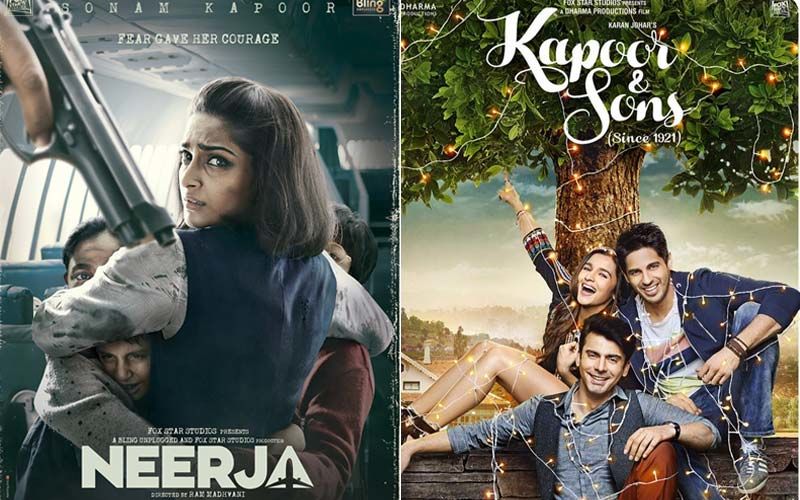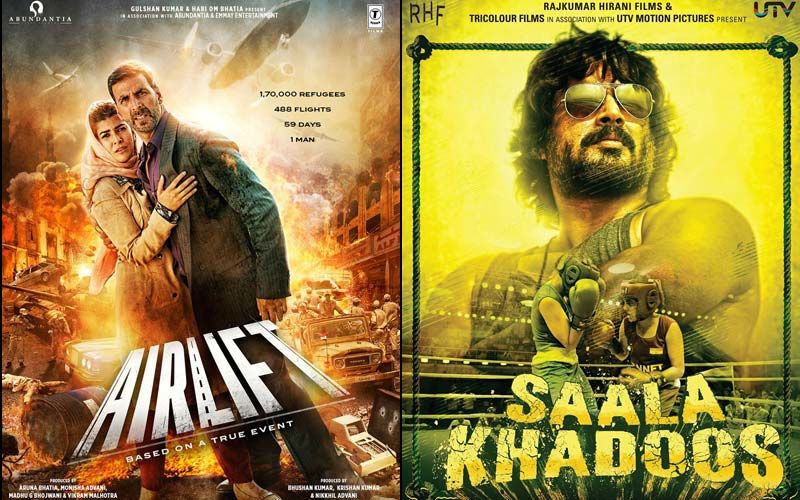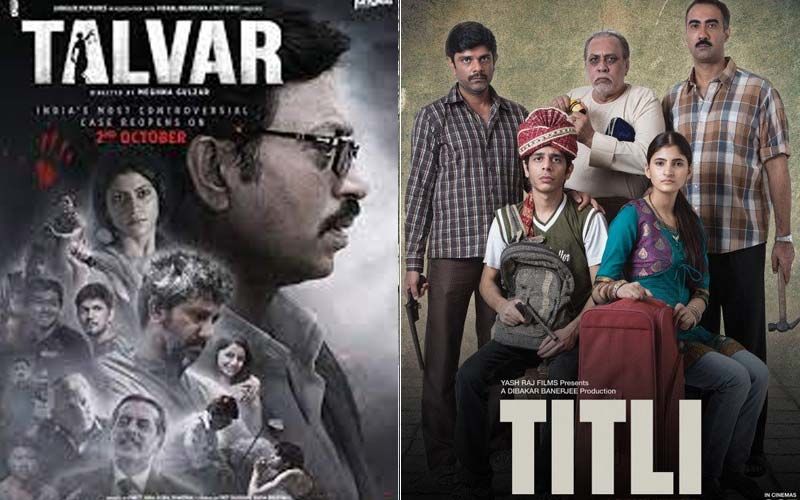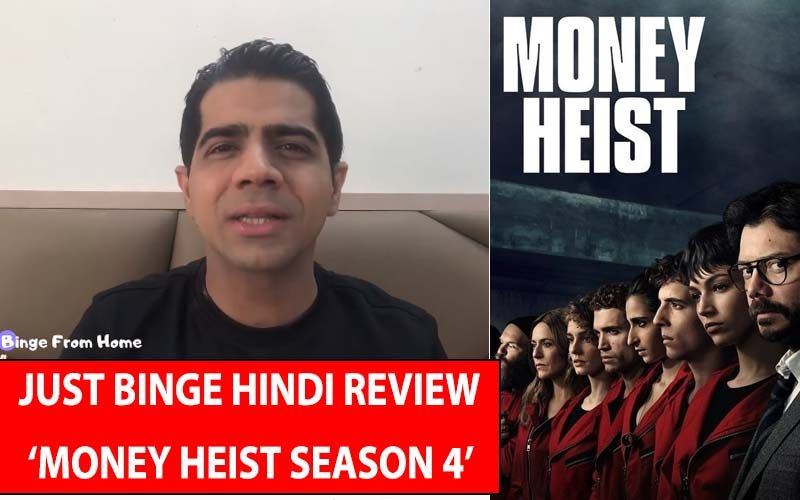A Look Back At Three Important Post- 9/11 Films From Bollywood
From A Wednesday to New York, a look back three important post 9/11 Bollywood films
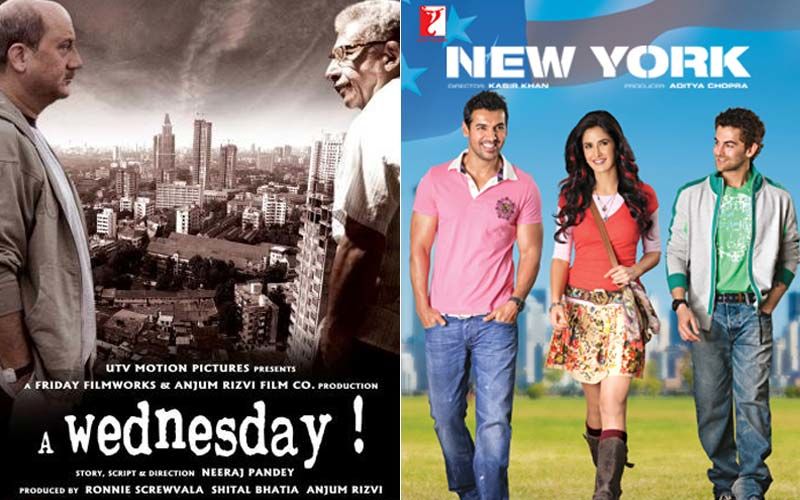
A Wednesday: Debutant director Neeraj Pandey turns the grim reality of terrorism into an engaging cat-and-mouse game played between a master blaster (Naseeruddin Shah) and a senior cop (Anupam Kher). Just the pleasure of watching Naseer and Anupam against the backdrop of a teeming bustling sinisterly jeopardized Mumbai city is ample reason to discard all our other misgivings about the sheer feasibility of the plot. Cleverly the narration manoeuvres all the physical action away from the two aging protagonists to a couple of hot-blooded young cops played effectively by Jimmy Shergill and Aamir Bashir, who hurl into camera range in a meteoric rush of adrenaline to remind us that the streets of Mumbai have always created a flutter in the clutter in our films. Just go back to every film from "Satya" to "Aamir" and see what we mean.
Cinematographer Fuwad Khan captures the blood on the roads of Mumbai with a disaffected relish. A lot of the film has been shot in stylish top-shots where the terrorists and counter-terrorist manoeuvrings appear larger than life and yet miraculously shrunken in the cosmic scheme of things. Violence in this way is made both comic and cosmic.
Most of the film cracks the entertainment code through the ongoing dialogue between the cop and the master-blaster, quite in Clint Eastwood and John Malvokich in Wolfgang Petersen's "In The Line Of Fire", triggering off a thought-provoking chain of ideas on the common man and terrorism and how far the violence of extremism affects the self-worth of the middle class.
The closing lap of the edge-of-the-seat is a clever plot-defining twist, perhaps too clever for its own good. For, what we get here is terrorism turned inside out, the anguish of extremism facing upside-down. It's an interesting but unacceptable end game, more suited to Quentin Tarantino when all the while we were looking at Pandey's film as belonging to Mahesh Bhatt's genre of cinema.
By the time Naseer's eruptive enthusiasm climaxes, the narration goes into the realm of the improbable, contriving to create an atmosphere of utter escapism in a film that you thought was stubbornly wedded to reality.But that's where Pandey has been heading all along. His narrative hurtles towards a photo-finish where the newspaper headlines are swallowed up in a swamp of thriller-rituals that take the plot aback to create an aura of unstoppable suspense.
Sanjoy Chowdhury's background music over-punctuates every sequence. But then that's precisely what this out-of-the-box terrorist-thriller was looking for.
The humour, when it strikes, is like the bomb blasts. Sudden and unexpected, though a little on the grimmer side.Veejay Gaurav Chopra as a shit-scared film star getting extortion calls is mousy enough to remind us that heroes don't come out of the movies. But heroic movies surely do come along once in a while from the movie industry. "A Wednesday" is certainly one of them.
Watch it to see how cleverly the director subverts the real-life headline-driven genre of cinema into a riveting race to the finish line.Most of all it's the performances of the two principal actors that holds "A Wednesday" together. Moving away from his recent comic antics, Anupam delivers a controlled performance as a cop who has seen it all. He happily allows Naseer to take over many scenes giving his co-star some riveting reactive cues.Naseer is back in full form after a rather embarrassing gap of cameo-commitments. Naseer in his element is an experience that needs no definition. He plays the jaded but spirited bomb-planting anonymous caller with a wry blunt and edgy sardonicism creating for his character a space that pitches his angst in the wide open loosely defined crowds of desolation in Mumbai.
A Wednesday is not quite the seamless little masterpiece on terrorism that you expected. It resorts to many wild swipes in the plot. Some characters like the dude-like computer hacker and the TV journalist, played by Deepal Shaw, give embarrassing single-note performance.
Watch Naseer and Anupam to know how a one-to-one drama works when two actors provide a psychological and emotional equilibrium from the two ends of the moral spectrum.
New York: It isn’t as if New York is the first remarkable film to synthesize terrorism and friendship. Mani Ratnam’s Dil Se comes to mind immediately where the enigma of the female terrorist played with supine splemdour by Manisha Koirala was often invested into scenes of disarming domesticity.New York goes a step further to explore the evolution of terrorism in the context of home-grown emotions such as friendship and betrayal. Director Kabir Khan, discards the exasperating documentary-like directness of his first feature film Kabul Express to transport us into a cinema that needles us into swirling sensations suggesting a close link between cinema and life. The resultant brew is gritty edgy and thought provoking.
New York challenges the existent codes of cinematic conduct, and not by being fashionably unconventional. On the surface it is an old fashioned film about three students who grow up and grow wise through the politics of our times. Here, we must mention the camaraderie that Kabir creates among his trio of players. What’s it about able casting that lifts a film notches above its destined caliber? We can’t imagine New York being the crucial work that it is without any other players.John, Katrina and Neil exude the scent of bonhomie. It’s in their secret-society smiles more than the words. The characters speak the language of today without making a strained effort to sound cool. “I’ve just come,” Neil introduces himself to the American-Indian dude-dada on the NY campus after a hug. “With just one hug?” comes the campus hero’s cocky answer. Ha ha. There’s a casual and comforting feeling to the threesome’s bonding, almost like a maturer mellower less in-your-face version of the hips youngsters in Jaane Tu…Ya Jaane Na.
Sameer (John), Maya (Katrina) and Omar (Neil Nitin Mukesh) know life won’t be a campus filled with Christmasy delights for too long. Disaster strikes soon enough. The progression of campus euphoria to the the way the grim political reality of American post 9/11 hits our protagonists,
is achieved with a refreshing lack of fuss and flamboyance. Kabir Khan is a minimalist movie maker. The emotions that tie the three friends, or the way John, Katrina and their little son try to form a haven away from a world of strife stress and discrimination, shows the filmmaker’s fingers are on the pulse even as his characters’ hands move willy-nilly to the trigger.
It would be easy to designate New York as a well-shot engaging drama on how global terrorism affects the lives of three NRIs in the US. The politics underlining the drama of Kabir Khan’s cinema is so powerfully and persuasively positioned, right down to the pacifist ending when the terrorist ka beta is the school champ in the Land Of Dreams, that you come away from New York feeling chastened by your habitual cynicism about cinema on terrorism and violence.
Here’s a film that cares about the prejudices that have taken over the world. When a small–part actor called Nawazuddin on a camera-within-camera tells Katrina Kaif about the humiliation, torture and indelible wounds that he suffered during detention for suspected terrorism, you are no longer watching a bright sassy film blending terrorism and entertainment. You are watching a slice of life. Make no mistake about that.
My two favourite sequences in the film both feature the then-unknown Nawazuddin. Watch his face when the American cop frisks Katrina’s character. It’s a moment that defines cultural prejudices and discrimination.Katrina, indeed comes into her own as an actress of substance, giving her best shot to the last half-hour as a wife of a terrorist trying to keep her moral equilibrium in sync with her husband’s sinking values. From the carefree effervescent campus girl to the anguished wife, Katrina makes the journey look plausible all the way. Neil as the sophomore with stars and stripes in his eyes is fully convincing credible and supportive of the two central performances.
New York is a coming-of-age film for John Abraham. As Sam(eer) the Indian-American dude whose American Dream turns into a nightmare of terrorism and persecution, John creates an intriguing graph for his character. He performs the sequences of incarcerated torture with a naked intensity that rips open wounds that never healed. Whether he’s busy playing the campus rock-star or the guy fitting phone bombs into the FBI headquarters we don’t really know the angels and demons that occupy the Sam’s mind. John just flows with the character’s pain of karma with a performance that suggests seamless vigour rather than laboured angst.Irrfan Khan as the FBI agent who has a point to prove about the Islamic mind-space is wry snappy cynical. His character’s back-projected life suggests an Italian wife who insists on feeding him pastas.
Stereotypical portrayals of the cultural diaspora are fortunately rare in this piece of contemporary art which has plenty of heart, a heart that never overflows in an embarrassing torrent of emotions. Indeed for better or worse, New York is Yashraj Films’ most international product to date.
Aseem Mishra’s cinematography and Julius Packiam’s background score aid the narrative’s progression considerably, creating a powerhouse of picture-postcard images which secrete their terrifying subtext with a dormant fluency.The dialogues on terrorism and the isolation and persecution of the average Muslim after 9/11 are brought into play much later. In fact the word ‘Muslim’ is not mentioned until the second-half when Irrfan gets into the diatribe mode.
New York depicts the end of a dream, American or otherwise, in a language that conveys the sublimated reality of a dream lived in sleep. It’s a fascinating view of friendship, loyalty and politics done in shades that reject garishness and embrace a serene, supple but strong style of narration,New York is an important film. Not only for its political message. But also because it dares to treat basic emotions in a language that’s still largely alien to our cinema.
Kurbaan: With his directorial debut coming as it does with the erroneously filmy title of Kurbaan, Rensil d’Silva carries the spoken unspoken, visual and metaphorical language of mainstream cinema to an unvisited distant shore.Blending the thorny theme of the political-cultural identity of the Muslim community post 26/11 with the commercial identity of contemporary Hindi cinema is not an easy task. The film manages to be many notches superior to other national and international films on global terrorism, a theme that now threatens to turn into a full-blown commercial formula.
Kurbaan averts a catastrophic collision of 'message' and entertainment by preserving a virile and healthy contempt for the trite expressions of formulistic terrorism in films that use fundamentalism as a villainous formula. Here the characters are not representational of Islamic ideology. They function in the brilliantly-designed plot as people who subscribe to the view that the Muslim community across the world are persecuted, hounded victims of an American oil-politics that threatens to annihilate the Islamic world.
This is a very thin ice for a debutant director to walk on. Rensil D'Silva's film says, sometimes right out loud, that a sense of aggressive isolation grips the entire Muslim community. There are either those (like the chanters played by Om Puri, Kirron Kher and Saif Ali Khan) who think a direct action plan of retaliation and retribution is required to save Muslims from mass destruction. Or, more alarmingly, there are those like Vivek Oberoi and his father (Kulbhushan Kharbanda) who are tacitly in favour of violence against their community's collective persecution.
Either way, Rensil's film looks at the theme of Islamic terrorism with fearless and brutal honestly. There's no attempt to dilute the damning exposition on the ghetto-styled fundamentalism of the Muslim community in the US.The narrative immediately and inextricably plunges Avantika (who becomes the audiences' viewpoint in the tale of terrorism) into the vortex of a 26/11-styled conspiracy being hatched in her backyard on a deceptively quiet suburban street filled with Asian homes.
If the closet terrorists in the narrative proves themselves master plotters, director Rensil D'Silva is no less. While the master-plotters in Kurbaan finally fail, Rensil walks past the finishing line with victorious strides. With cinematographer Hemant Chaturvedi (giving the narration a hue of heightened sinister ness) Rensil moves stealthily in and out of politically-challenged lives with the least amount of drama and ostentation.
The background score is kept at a bare minimum. The sense of heightened poignancy which is constantly created in celluloid dramas of the doomed is stubbornly averted. Kurbaan creates its drama from the characters' misbegotten sense of identity. From that vantage point of disorientation the film dexterously moved into the agile mode of action-driven conflicts.
From the pre-intermission point in the narration where Ehsaan and his accomplice are chased down by cops as they carry a dead Muslim wife's body for burial Kurbaan is one relentlessly breathless treatise on 'How To Create A Prolonged Climax In A Plot Without Losing The Theme's Bearings.'The film has been shot as an extended crime thriller which penetrates deeper and deeper into the anatomy of a crime thriller until the core of the crisis is reached with painful bluntness. Miraculously the director avoids the shrill will right to the blood-spattered finale. There is room in the commodious narration for disgruntled characters from a multitude of Islamic countries huddled in the US to create retaliatory mayhem. But at the core there are just three characters, the terrorist, his pregnant and rebellious wife and the expose-driven journalist, played by Saif, Kareena and Vivek Oberoi.Oberoi, in spite of his now-on-now-off Yankee accent plays the conflicted progressive American Muslim with a resolute understanding of the underlying politics that plagues his character's soul. But Saif Ali Khan is a disappointment. In a role that could have been a career-defining event the actor pitches a performance as a not-so-reluctant terrorist that simply swims on the surface. There's no attempt by the actor to understand the workings of Ehsaan's mind or to revisit Ehsaan's roots. What we see is a confused rather than a politically and religiously conflicted soul tormented by an ideological crisis.
Where is the mean-spirited guy who exploited and cheated Urmila Matondkar in Ek Hasina Thi? Or the innerving enigma of the tortured terrorist that Manisha Koiralaplayed in Dil Se? Wake up and smell the Kafir, Saif!
Image source: IMDb, Youtube/YRF/DharmaProduction
